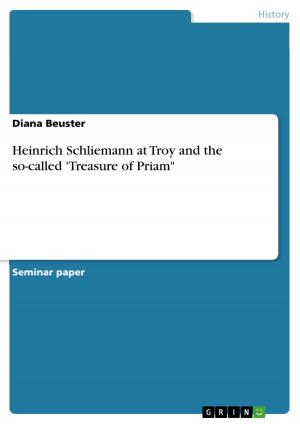Current Advocates of Illegals
When Democracies Violate Human Rights and Film and Fiction Speak Up for the Mute
Fiction & Literature, Literary Theory & Criticism, British| Author: | Raúl Gaston Krüger | ISBN: | 9783640968916 |
| Publisher: | GRIN Verlag | Publication: | July 27, 2011 |
| Imprint: | GRIN Verlag | Language: | English |
| Author: | Raúl Gaston Krüger |
| ISBN: | 9783640968916 |
| Publisher: | GRIN Verlag |
| Publication: | July 27, 2011 |
| Imprint: | GRIN Verlag |
| Language: | English |
Seminar paper from the year 2009 in the subject English - Literature, Works, grade: 1,7, University of Tubingen (Seminar für Englische Philologie), course: Illegality in Theory, Fiction and Film, language: English, abstract: Writers, screenwriters and directors are magicians; they can carry us off to the most mythical and enchanted worlds, they can make the sweetest dreams come true, and they can make us dream and hope. But sometimes they are advocates, even more than they are magicians; they make us see invisible things, while they are showing us the real world and, in some cases, the real world is far from a sweet dream and without hope. 'To reveal the invisible [...] not only changes the way we see the world, it changes our responsibilities in it' (Hovet, The Invisible London). That is what they sometimes need to do, make us feel responsible. For that reason current authors and directors show us the invisible world of illegals, they give faces and stories to ghosts that often are misused from politics and media to create fear. Fear that is needed to justify the state of exception and the state of exception is needed to maintain or expand political power. This paper is concerned with the film Dirty Pretty Things directed by Stephen Frears, and the novels Refugee Boy by Benjamin Zephaniah and A Distant Shore by Caryl Phillips. It uses them as representatives of the attempt of writers and directors to give voice to the group of illegal immigrants who do not have a political voice by themselves. As Frears phrases it, 'Asylum is a huge political issue and the government doesn't handle it very well. [...] There's no attempt made to explain the problem, to explain that these people are serious.' (Lucia, Interview 9) Thus, the authors try to explain the problem and they have obviously another point of view than their governments. To what extent the self-appointed advocates defend the interests of illegals and in how far they can change prejudices, distorted images and, at least, political decisions should be discussed in this paper. The emphasis lies here on Great Britain as one major representative of the western countries, for the novels and the film deal with situations in the United Kingdom. Further-more, the change in immigration policy in the last decade there was and is largely and controversially discussed.
Seminar paper from the year 2009 in the subject English - Literature, Works, grade: 1,7, University of Tubingen (Seminar für Englische Philologie), course: Illegality in Theory, Fiction and Film, language: English, abstract: Writers, screenwriters and directors are magicians; they can carry us off to the most mythical and enchanted worlds, they can make the sweetest dreams come true, and they can make us dream and hope. But sometimes they are advocates, even more than they are magicians; they make us see invisible things, while they are showing us the real world and, in some cases, the real world is far from a sweet dream and without hope. 'To reveal the invisible [...] not only changes the way we see the world, it changes our responsibilities in it' (Hovet, The Invisible London). That is what they sometimes need to do, make us feel responsible. For that reason current authors and directors show us the invisible world of illegals, they give faces and stories to ghosts that often are misused from politics and media to create fear. Fear that is needed to justify the state of exception and the state of exception is needed to maintain or expand political power. This paper is concerned with the film Dirty Pretty Things directed by Stephen Frears, and the novels Refugee Boy by Benjamin Zephaniah and A Distant Shore by Caryl Phillips. It uses them as representatives of the attempt of writers and directors to give voice to the group of illegal immigrants who do not have a political voice by themselves. As Frears phrases it, 'Asylum is a huge political issue and the government doesn't handle it very well. [...] There's no attempt made to explain the problem, to explain that these people are serious.' (Lucia, Interview 9) Thus, the authors try to explain the problem and they have obviously another point of view than their governments. To what extent the self-appointed advocates defend the interests of illegals and in how far they can change prejudices, distorted images and, at least, political decisions should be discussed in this paper. The emphasis lies here on Great Britain as one major representative of the western countries, for the novels and the film deal with situations in the United Kingdom. Further-more, the change in immigration policy in the last decade there was and is largely and controversially discussed.















